

Unlocking the benefits of open data. 7 November 2014 Coordinated national approaches to developing open data strategies will help the UK’s researchers to forge ahead on the international stage, says Phil Richards Robert Boyle, Charles Darwin, Benjamin Franklin, Allessandro Volta.
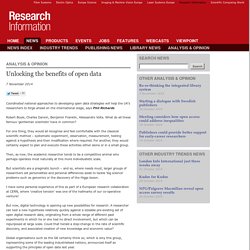
What do all these famous ‘gentleman scientists’ have in common? For one thing, they would all recognise and feel comfortable with the classical scientific method – systematic experiment, observation, measurement, testing against a hypothesis and then modification where required. For another, they would certainly expect to plan and execute these activities either alone or in a small group. Why LinkedIn's university rankings matter. It’s that time of year when undergraduates who want to continue their studies are busily looking around for advice on which masters degree to apply for and school leavers are pondering their university application preferences.
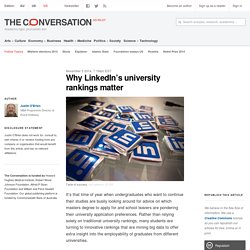
Rather than relying solely on traditional university rankings, many students are turning to innovative rankings that are mining big data to offer extra insight into the employability of graduates from different universities. Social networking site LinkedIn recently released its own university rankings outlining which degrees get its members the best jobs within certain sectors. This comes after Google released its own list of the “most searched-for” universities in which the Open University, Phoenix and several Indian institutions come to the fore, ahead of some of the other “traditional” destinations. ProSAR. Mesma Online SAR Completion Software. Self assessment solutions for the learning & skills sector.
Collecting data on students: is it useful to know which books they've read? Data analytics helps universities identify students who need more support.
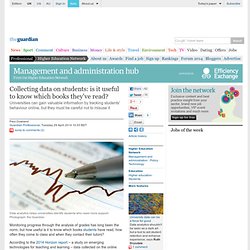
Photograph: the Guardian. Big Data: Are you ready for blast-off? Big data can boost student experience. Big data research to get £70 million boost. David Willetts is set to unveil £72.6 million of new funding to help academics unlock the potential of “big data”.
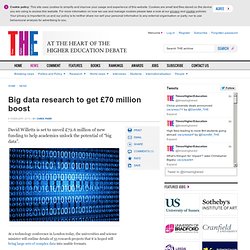
At a technology conference in London today, the universities and science minister will outline details of 55 research projects that it is hoped will bring large sets of complex data into usable formats. One project, based at Lancaster University, aims to convert thousands of musical scores which are stored online as images into a format that would allow them to be accessed by today’s musicians.
Others that are receiving a share of the money hope to develop a better understanding of human disease, take steps towards tackling obesity, and solve transport problems. Bett show: four areas of technology that could transform universities. JISC Inform / Issue 35, Winter 2012. From among the many projects: The Open University (OU) tracked students as they engaged with online resources, identifying what they looked at online, and how long for, to explore ways to predict potential failure to achieve, and then target the available resources to make the most effective early interventions possible.
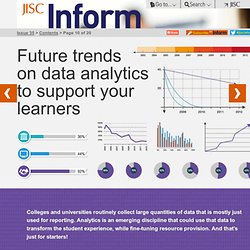
At the University of Sheffield, the project team used geographical mapping and demographic data to track the background that students arrive from, to examine the impact that social and economic status may have on attainment, with a view to planning appropriate interventions to support struggling students at an early stage. Meanwhile, projects within the Relationship Management Programme, such as one run by the University of Derby, examined ways to deliver ‘quick wins’ via service design, creating responsive support structures that adapt to the needs of individual learners. 2013: The year we all went 'mobile' 19 December 2013Last updated at 19:15 ET By Matthew Wall Business reporter, BBC News A mobile state of mind: mobile phones, mobile workforces, mobile data This year was the year we all went mobile.
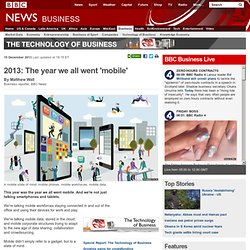
And we're not just talking smartphones and tablets. We're talking mobile workforces staying connected in and out of the office and using their devices for work and play. We're talking mobile data, stored in the cloud; and mobile corporate structures trying to adapt to the new age of data sharing, collaboration and crowdsourcing. JISC Inform / Issue 36, Spring 2013. The administration functions of HE and FE institutions routinely collect large volumes of data.

Opening up large data samples means that control of their use is lost as people discover new uses for it. So it’s important that institutions optimise collection processes, tackle repetition and accuracy issues, and consider legal and ethical implications. Jisc has produced the CETIS Analytics Series: Legal, Risk and Ethical Aspects of Analytics in Education to help. And there’s a potential danger that, as the appetite for open data grows, the burden on admin teams could grow. Organisations such as the Higher Education Statistics Agency (HESA) are working on ways to collect more useful data and to make that openly available, but they are also working with BIS on developing a more streamlined approach so that the workload for institutions will actually reduce.
The result is a new Infokit, due to be published this month. CETIS Analytics Series: Analytics; what is changing and why does it matter? « publications. Link: CETIS Analytics Series Vol 1, No 1.
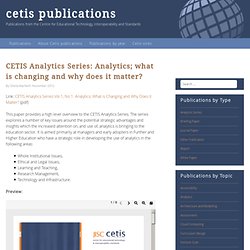
Will Analytics transform Education? Effective use of data is vital for success in today’s business world.
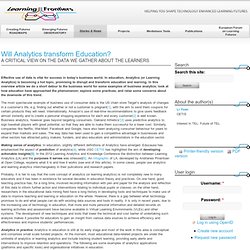
In education, Analytics (or Learning Analytics) is becoming a hot topic, promising to disrupt and transform education and learning. In this overview article we do a short detour to the business world for some examples of business analytics; look at how education have approached the phenomenon; explore some practices; and raise some concerns about the downside of this trend. The most spectacular example of business use of consumer data is the US chain store Target’s analysis of changes in a customer’s life, e.g. finding out whether or not a customer is pregnant[1], with the aim to send them coupons for certain products they will need.
Internationally, Amazon’s use of real-time recommendations to give users feedback almost instantly and to create a personal shopping experience for each and every customer[2] is well known. Business analytics, however goes beyond targeting consumers. 1. 2. 3. Research data management. The issue Research data management is important for institutions as well as researchers.
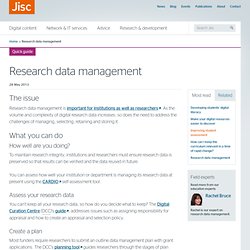
As the volume and complexity of digital research data increases, so does the need to address the challenges of managing, selecting, retaining and storing it.
Understanding your data. The issue Activity data is the record of any user action, online or in the physical world, that can be logged on a computer. Universities and colleges have long collected vast amounts of data; from figures on how students use the library, to recruitment statistics and academic research citations. Owing to recent changes in the kinds of data they are asked to submit to bodies like UCAS, there are now new opportunities for analysing that data. The digital opportunity.